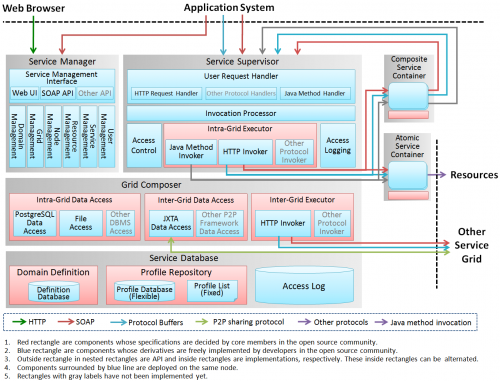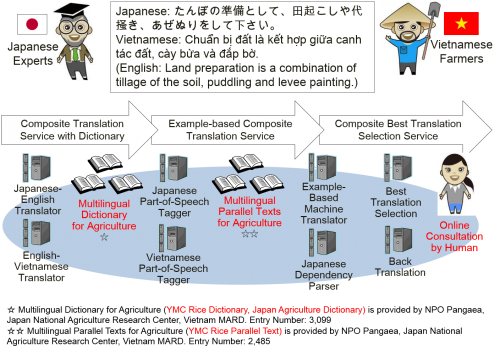Overview | Research | Selected Publications
Overview
To realize the Internet-based worldwide collaboration environments, it is necessary to build an infrastructure to support the interaction between various cloud services on the Internet and the physical world where we live in. In this project, we conduct the research on advanced technologies for Internet of Services (IoS) infrastructure that freely enables the composition of smartphone applications and cloud services on the Internet. We also deal with the Internet of Things (IoT) environments that are driven by various sensors and fabrications.
Research results on IoS in this projects have been published in many top international conferences and journals of services computing like ICSOC, SCC, ICWS and IEEE Transactions on Services Computing. We got the best paper award in SCC 2015.
Research
Implementation of IoS Infrastructure
The Language Grid is realized based on the Service Grid Infrastructure by using the Internet of Services (IoS) technologies. Service Grid is an infrastructure for accumulating and sharing Web services. Resources with complicated intellectual property issues are wrapped as Web services and shared on the Service Grid. We develop the Service Grid Server Software and manage it as open source software, which was also used by the US NSF project, Language Applications Grid.
Moreover, we extend the Service Grid and aim at developing new advanced technologies for IoS infrastructure that freely enables the composition of smartphone applications and cloud services on the Internet.

Service Composition
To realize the IoS infrastructure, we address the research issue of service composition, which is one of the most important topics in the area of services computing. Service composition is a technology that composes multiple atomic services accumulated in the IoS infrastructure to satisfy users’ requirements of quality of services (QoS). Traditionally, service composition was realized by automatically generating service workflow based on AI planning and other technologies. However, it is more important to select appropriate services to execute the service workflow since there are always numerous candidates of atomic services for the same function.
In this research, we deal with the service composition and evaluation considering different attributes of QoS, requirements of service users, and policies of service providers as well. Results is this research topic have been published in many top international conferences and journals of services computing. Especially, the research of policy-aware optimization of parallel execution of composite services received the IEEE SCC 2015 best paper award.

IoS/IoT Collaborative Service Environments
In this research, we focus on the Internet of Things (IoT) environment that is driven by various sensors and fabrications to realize the interaction between people and things. By connecting IoS and IoT seamlessly, we aim at realizing the unique collaboration environment where various things communicate with each other.
To realize our research objectives, we also cooperate with Kyoto University Design School to obtain skills for design workshop and design fabrication. We are planning to provide multilingual support for foreign travelers as well by utilizing IoS and IoT.

Selected Publications
- [Journal]
- Mai Xuan Trang, Yohei Murakami, and Toru Ishida. Policy-Aware Service Composition: Predicting Parallel Execution Performance of Composite Services. IEEE Transactions on Services Computing, 2016.
- [Conference]
- Mai Xuan Trang, Yohei Murakami, Toru Ishida. Policy-Aware Optimization of Parallel Execution of Composite Services. 12th IEEE International Conference on Services Computing (SCC 2015), pp. 106-113, 2015. (Best Paper Award)
- Kemas M.Lhaksmana, Yohei Murakami, Toru Ishida. Cascading Failure Tolerance in Large Scale Service Networks. 2015 IEEE 12th International Conference on Services Computing (SCC 2015), New York, USA, 2015.
- Xin Zhou, Toru Ishida, Yohei Murakami. Dynamic Sliding Window Model for Service Reputation. 2015 IEEE 12th International Conference on Services Computing (SCC 2015), New York, USA, 2015.
- Xin Zhou, Shigeo Matsubara. Towards Robust Reputation System Based on Clustering Approach. 2015 IEEE 12th International Conference on Services Computing (SCC 2015), New York, USA, 2015.
- Donghui Lin, Chunqi Shi, and Toru Ishida. Dynamic Service Selection Based on Context-Aware QoS. In Proceedings of 9th IEEE International Conference on Services Computing (SCC2012), pp. 641-648, 2012.
- Chunqi Shi, Donghui Lin, and Toru Ishida. User-Centered QoS Computation for Web Service Selection. In Proceedings of 19th IEEE International Conference on Web Services (ICWS2012), pp. 456-463, 2012.
- Yohei Murakami, Masahiro Tanaka, Donghui Lin, and Toru Ishida. Service Grid Federation Architecture for Heterogeneous Domain. In Proceedings of 9th IEEE International Conference on Services Computing (SCC2012), pp. 539-546, 2012.
- Donghui Lin, Toru Ishida, Yohei Murakami, and Masahiro Tanaka. Improving Service Processes with the Crowds. 9th International Conference on Service Oriented Computing (ICSOC2011), industry track, Paphos, Cyprus, 2011.
- Masahiro Tanaka, Yohei Murakami, Donghui Lin and Toru Ishida. Service Supervision for Service-oriented Collective Intelligence. IEEE International Conference on Services Computing (SCC2010), pp.154-161, July 7th, 2010.
- Yohei Murakami, Naoki Miyata and Toru Ishida. Market-Based QoS Control for Voluntary Services. IEEE International Conference on Services Computing (SCC2010), pp. 30-377, July 7th, 2010.
- Masahiro Tanaka, Toru Ishida, Yohei Murakami, and Satoshi Morimoto. Service Supervision: Coordinating Web Services in Open Environment. IEEE International Conference on Web Services (ICWS2009), pp. 238-245, 2009.
